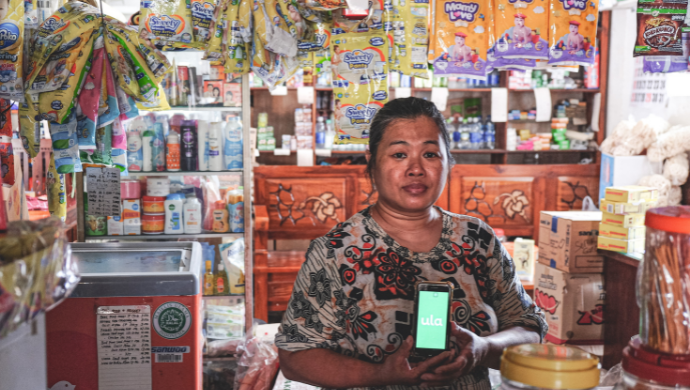
The Asian startup ecosystem continues its remarkable transformation –
Over the past few years, Asia’s startup scene has established itself into one of the world’s most vibrant and diverse innovation hubs. From digital-first solutions for rural aquaculture farmers in India to B2B platforms revolutionizing Indonesia's micro-retail landscape, early-stage founders are tackling local challenges in ways that can scale regionally and even globally. The momentum of these young companies are particularly strong in sectors like agritech, fintech, logistics, and AI-powered solutions – areas that directly respond to some of the regions’ biggest growth opportunities.
Here’s our spotlight on 3 promising Asian startups that recently secured funding between Seed and Series B. Take a look, and maybe you’ll spot a name that’s about to become Asia’s next big success story.

Founded: 2017 | Headquarters: Chennai | Sector: Agritech
A chance encounter on a train sparked what would become one of India’s most promising agritech ventures. When founder Rajamanohar Somasundaram met a shrimp farmer on a train during his commute in 2017, he discovered a broken system where small farmers were trapped by unfair and inefficient supply chains with high costs, predatory lending, and exploitative middlemen. Fueled with motivation for improvement, Mr. Somasundaram decided to tackle this by building a platform that combines technology, on-the-ground support, and better market access all in one.
Their Core
This Chennai-based startup centers around Aqua Farmer, an AI-powered application that helps farmers monitor pond health, feed levels, and disease risks using satellite data and predictive analytics. Aquaconnect also built a local network of field advisors called Aquapartner, who visit farms to help with everything from feed supplies to technical training. When it’s time, Aquaconnect links them directly to domestic buyers and exporters, even managing to secure their first shrimp exports into Japan.
By the Numbers
The combination of high-tech tools and real-world support has shown promising results. Farmers using Aquaconnect saw their costs go down by approximately 30% while production went up by 20%. The platform’s user base has quadrupled, while its revenue has grown 14 times in just a few years.
Why It Matters
From a casual interaction with a stranger to transforming thousands of livelihoods, Acuaconnect is a solid example of how smart tech, finance, and local trust can come together to solve real problems. They prove that “boots on the ground, eyes in the sky” can reconstruct traditional industries by bridging the digital divide through hybrid technology-human networks.

Founded: 2014 | Headquarters: Jalan Kilang Barat | Sector: Logistics
Ninja Van is a rapidly-growing Singaporean logistics platform known for its extensive e-commerce parcel network, founded in 2014 by Lai Chang Wen and his colleagues. After riding the pandemic-driven surge in online shopping, the company is now shifting its focus from chasing sheer volume to reinforcing its foundations for sustainable profitability and operational resilience. This transition is becoming increasingly evident in how the business is investing in new verticals through challenging but necessary structural adjustments, while strengthening its core infrastructure.
Strategic Pivot
By providing last-mile delivery services for e-commerce players, they move millions of parcels across Southeast Asia every day. Their transformation reveals itself in two key diversification moves. Ninja Cold was launched, a dedicated cold-chain logistics service, handles temperature-sensitive goods such as fresh produce and pharmaceuticals – segments that run on steady, year-round demand and generally offer healthier margins than traditional parcel delivery. Ninja B2B was also introduced aiming at small retailers and F&B outlets that need regular, reliable restocking. By expanding into these new segments, Ninja Van is positioning itself to serve businesses with more predictable, recurring needs instead of relying solely on seasonal e-commerce peaks.
Operational Philosophy
Rather than rushing toward public listings, leadership has prioritized operational discipline through hub consolidation and team restructuring. Their focus on resilience over rapid scaling reflects a maturing approach to Southeast Asian market dynamics, where sustainable profitability trumps venture capital milestones.
The Takeaway
Diversifying into specialized segments with recurring demand patterns while strengthening core infrastructure positions Ninja Van for long-term sustainability in a competitive market. Their prioritization of operational excellence over immediate public market validation reflects a sophisticated understanding of Southeast Asia’s logistics landscape, where lasting success requires deep local partnerships and resilient supply chain networks rather than just rapid expansion.

Founded: 2020 | Headquarters: Jakarta | Sector: B2B Marketplace
Untung Lancar Amen, better known as Ula, is an Indonesian B2B marketplace that's quietly transforming the backbone of Southeast Asia’s retail economy. Founded in 2020 by Nipun Mehra, they cater to mom-and-pop shops, warungs, and small F&B outlets. Ula combines a curated digital storefront, inventory management tools, flexible financing, and a community network to modernize traditional retail in emerging markets. The business’s growth story is striking, raising $117.5 million within only two years while redefining how micro-retail operates in emerging markets. Such were achieved through intelligent financing, community touchpoints, and mobile-friendly technology into a seamless experience for small shops.
How it Works
In essence, the business acts as a one-stop shop for small retailers, offering access to over 10,000 stock keeping units that are delivered reliably to store owners. This simplifies ordering with transparent pricing, multiple checkout options, and no hidden fees. Behind the scenes, they also offer working capital in the form of pay-later options, crucial in markets where daily wages and limited cash flow are realities. Such flexibility acts as a key advantage in a market where daily-wage income and small cash reserves are norms. Sobal Ula, a platform built to be a community as well as a marketplace, enables store owners to become pickup points. This service is known as Titik Ula, which additionally connects to a peer-to-peer social commerce program called Teman Ula.
Technical Innovation
All of this is supported by a lightweight but robust technology stack which deserves particular attention. Their innovation was designed for even low-end smartphones, combining a retailer application, logistics and sales tools, administrative systems, and analytics. This accessibility-first approach ensures that digital transformation reaches Indonesia’s most remote retailers, not only urban tech-savvy shops.
Market Impact
Ula is a powerful example of how digital-first B2B platforms can uplift MSMEs by delivering convenience, trust, and economic opportunity. They demonstrate how community-centric models can turn individual retailers into network participants, creating ecosystem effects that extend far beyond traditional transactions.

What makes these companies particularly compelling isn’t just their impressive metrics or funding rounds – it’s their fundamental approach to innovation. The maturation of Asian entrepreneurship reveals three critical patterns reshaping Asian entrepreneurship.
First, successful ventures combine advanced technology with deep local market understanding – whether it be through field advisors, community networks, or accessibility-focused design. Second, sustainability increasingly outweighs rapid scaling, with founders prioritizing operational resilience over venture capital timelines. The final and most significant factor is that these startups solve uniquely Asian challenges rather than adapting Western solutions. From fragmented aquaculture supply chains to archipelago retail distribution, they address infrastructure gaps and market dynamics that Silicon Valley playbooks never anticipated.
As Asia’s startup ecosystem continues to evolve, these pioneers demonstrate how regional innovation can achieve global relevance through local application first. Their success stories will likely inspire the next generation of Asian entrepreneurs to think regionally while building for international impact.
0 Comments